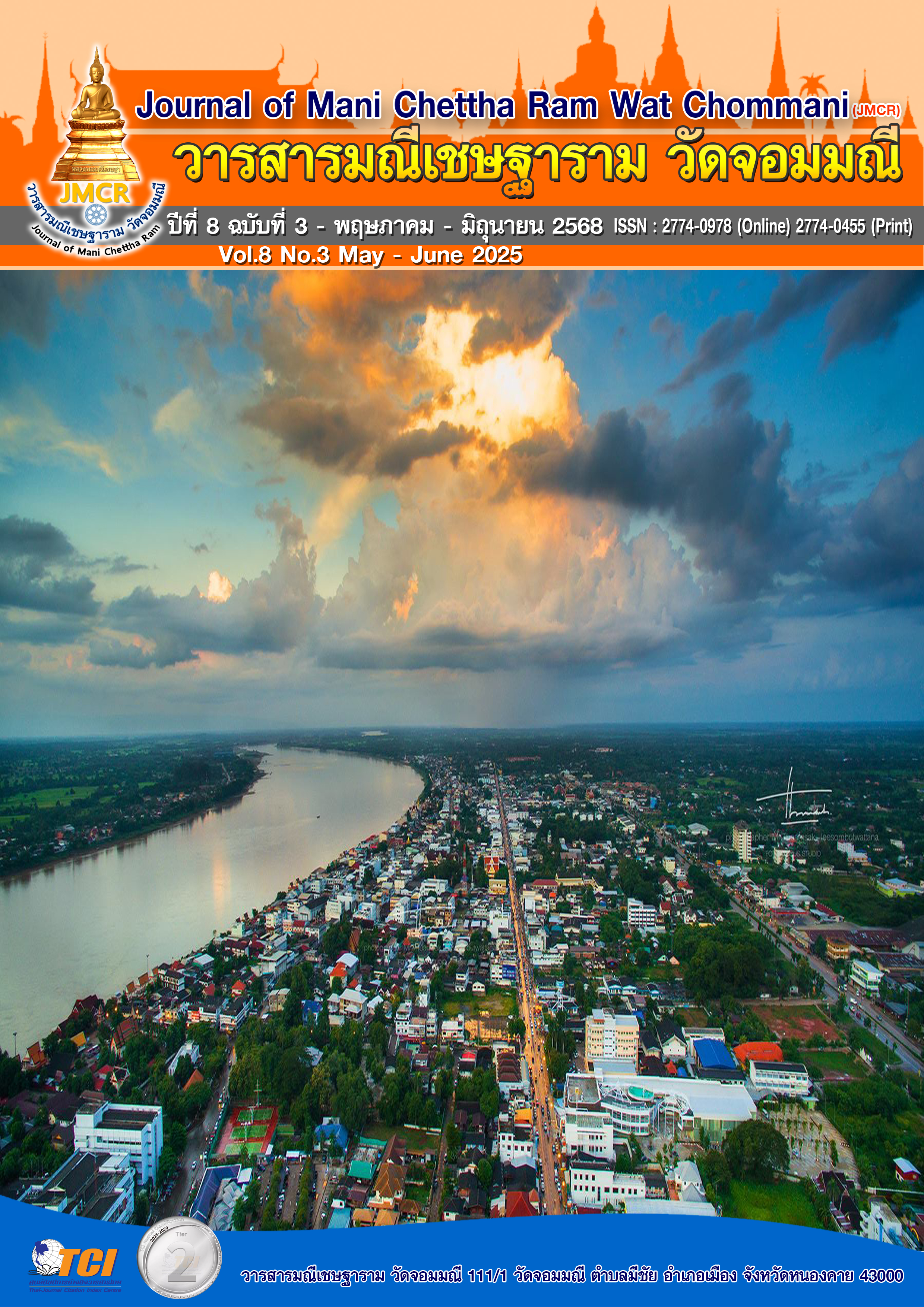ปัจจัยที่ส่งผลต่อการคิดทางคณิตศาสตร์ของนักเรียนชั้นมัธยมศึกษาปีที่ 2
คำสำคัญ:
การคิดทางคณิตศาสตร์, ปัจจัยที่ส่งผลต่อการคิดทางคณิตศาสตร์บทคัดย่อ
การวิจัยในครั้งนี้มีวัตถุประสงค์เพื่อ 1) ศึกษาปัจจัยที่ส่งผลต่อการคิดทางคณิตศาสตร์ของนักเรียนระดับชั้นมัธยมศึกษาปีที่ 2 และ 2) สร้างสมการพยากรณ์ปัจจัยที่ส่งผลการคิดทางคณิตศาสตร์ของนักเรียนระดับชั้นมัธยมศึกษาปีที่ 2 กลุ่มตัวอย่างที่ใช้ในการวิจัยครั้งนี้ ได้แก่ นักเรียนระดับชั้นมัธยมศึกษาปีที่ 2 โรงเรียนเทศบาลบูรพาพิทยาคาร ภาคเรียนที่ 2 ปีการศึกษา 2567 จำนวนนักเรียนทั้งหมด 119 คน ได้มาโดยการสุ่มแบบกลุ่ม เครื่องมือที่ใช้ในการวิจัย ได้แก่ แบบทดสอบการคิดทางคณิตศาสตร์ แบบทดสอบความเข้าใจ ทางคณิตศาสตร์ แบบทดสอบความรู้ทางคณิตศาสตร์ แบบทดสอบการเชื่อมโยงทางคณิตศาสตร์ และแบบวัดเจตคติทางคณิตศาสตร์ สถิติที่ใช้ในการวิเคราะห์ข้อมูล ได้แก่ ร้อยละ ค่าเฉลี่ย ส่วนเบี่ยงเบนมาตรฐาน สัมประสิทธิ์สหสัมพันธ์แบบเพียร์สัน และการวิเคราะห์การถดถอยเชิงซ้อนแบบสเต็ปไวส์
ผลการวิจัยพบว่า 1) ปัจจัยที่ส่งผลต่อการคิดทางคณิตศาสตร์ โดยเรียงลำดับค่าสัมประสิทธิ์สหสัมพันธ์ที่ระดับนัยสำคัญทางสถิติ .05 จากค่ามากไปหาน้อย มีตัวแปรความเข้าใจทางคณิตศาสตร์ ( ) ความรู้ทางคณิตศาสตร์ ( ) การเชื่อมโยงทางคณิตศาสตร์ ( ) เจตคติทางคณิตศาสตร์ ( ) มีความสัมพันธ์กับการคิดทางคณิตศาสตร์ โดยมีค่าค่าสัมประสิทธิ์สหสัมพันธ์ ดังนี้ .823, .793, .776 และ .634 ตามลำดับ ซึ่งทุกตัวแปรมีนัยสำคัญทางสถิติที่ระดับ .05 และ 2) ปัจจัยด้านความเข้าใจทางคณิตศาสตร์ ( ) ด้านความรู้ทางคณิตศาสตร์ ( ) ด้านการเชื่อมโยงทางคณิตศาสตร์ ( ) และด้านเจตคติทางคณิตศาสตร์ ( ) ร่วมกันพยากรณ์การคิดทางคณิศาสตร์ ( ) ของนักเรียนชั้นมัธยมศึกษาปีที่ 2 ได้ร้อยละ 74.80 อย่างมีนัยสำคัญทางสถิติที่ระดับ .05 โดยสามารถนำค่าที่ได้มาเขียนสมการพยากรณ์ได้ดังนี้
สมการพยากรณ์ในรูปคะแนนดิบ คือ
สมการพยากรณ์ในรูปคะแนนมาตรฐาน คือ
เอกสารอ้างอิง
ฐิติพร ลินิฐฎา. (2547). การศึกษาปัจจัยที่มีผลต่อการตัดสินใจศึกษาต่อระดับอุดมศึกษาและผลสัมฤทธิ์ทางการเรียนคณิตศาสตร์ของนิสิตนักศึกษาชั้นปีที่ 1 โครงการผลิตครูการศึกษาขั้นพื้นฐานระดับปริญญาตรี (หลักสูตร 5 ปี) สาขาคณิตศาสตร์. ใน วิทยานิพนธ์ครุศาสตรมหาบัณฑิต, สาขาการศึกษาคณิตศาสตร์. จุฬาลงกรณ์มหาวิทยาลัย.
โรงเรียนเทศบาลบูรพาพิทยาคาร. (2567). ข้อมูลพื้นฐานนักเรียน ปีการศึกษา 2567. เรียกใช้เมื่อ 7 ตุลาคม 2567 จาก https://www.bppschool.ac.th/.
วาสุกรี แสงป้อม. (2558). การเชื่อมโยงทางคณิตศาสตร์เพื่อการสร้างองค์ความรู้ของผู้เรียน. วารสารศึกษาศาสตร์ มหาวิทยาลัยนเรศวร,16(2). 210-215.
สถาบันทดสอบทางการศึกษาแห่งชาติ. (2566). ผลการทดสอบ O-NET ชั้นมัธยมศึกษาปีที่ 3 ปีการศึกษา 2566. เรียกใช้เมื่อ 1 เมษายน 2567, จาก www.niets.or.th.
สถาบันส่งเสริมการสอนวิทยาศาสตร์และเทคโนโลยี. (2566). ผลการประเมินสมรรถนะนักเรียมาตรฐานสากล (PISA) ปี 2022 ของประเทศไทย. เรียกใช้เมื่อ 1 เมษายน 2567 จาก https://pisathailand.ipst.ac.th.
อลิสรา ชมชื่น (2550), การพัฒนากระบวนการเรียนการสอนโดยการบูรณาการทฤษฎีการพัฒนาความเข้าใจทางคณิตศาสตร์ การสื่อสาร และการให้เหตุผล เพื่อเสริมสร้างสมรรถภาพทางคณิตศาสตร์ของนักเรียนมัธยมศึกษาตอนต้น. ใน วิทยานิพนธ์ครุศาสตรดุษฎีบัณฑิต, สาขาหลักสูตรและการสอน จุฬาลงกรณ์
มหาวิทยาลัย.
Isa, N., & Ibrahim, H. (2023). The relationship between students’ mathematics attitude and their mathematical thinking. Journal of Islamic, Social, Economics and Development (JISED), 8(56), 664–680.
Jawad, L. F. (2022). Mathematical connection skills and their relationship to creative and effective thinking among secondary school students. Journal of Education and Practice, 13(5), 421–430.
Joutsenlahti, J., & Perkkilä, P. (2022). Mathematical thinking and understanding in learning of mathematics. LUMAT: International Journal on Math, Science and Technology Education, 10(2), 1–6.
Kriegler, S. (2004). Just what is algebraic thinking. Retrieved April 10, 2024. from shastacoe.org Reys, R. E., et al. (2004). Helping children learn mathematics. (7th ed.). NY: John Wiley & Sons.
Rickart, C. (1997). Structuralism and mathematical thinking. In The Nature Mathematical Thinking. (1st ed.). Routledge.
Yorulmaz, A., et al. (2017). Investigation of the effects of mathematical thinking states of form teachers on their mathematics teaching anxieties. European Journal of Educational Research, 6(4), 485–493.
Zaman, A. (2011). Relationship between mathematical thinking and achievement in mathematics among secondary school students of North West Frontier Province, Pakistan. In Doctoral dissertation. Faculty of social Sciences. International Islamic University, Islamabad, Pakistan.




